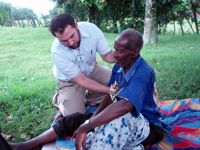On a mission
Posted: September 12, 2012
The night began like any other at the rural Kenyan hospital, Tenwek. From bone fractures to bladder cancer, Logan Banks, DO, ’06, helped many that evening. But the night was far from over.
It was well after midnight when two brothers came through the doors, leaving a bloody trail as they made their way to the emergency room. After a machete fight, one brother received a blow to the skull and the other, who had time to raise his hands in defense, was slashed in the forearm down to the bone.
With limited resources and staff, the brother with the brain injury was rushed to the only operating room, and Dr. Banks took the brother with the gashed arm to a corner of the ER. Sitting under a dim lamp, he whispered a small prayer and began sewing the gaping wound.
This is just one of many wild encounters Dr. Banks experienced while in the medical mission field.
Dr. Banks, who is currently on faculty at Cox Family Medicine Residency in Springfield, Mo., began participating in mission trips as an undergraduate student. As his education advanced, so did his commitment to the underserved. After his first year of medical school, he took his first medical mission trip to Bolivia, where he served in a clinic for two weeks.
“It really opened my eyes to the differences in healthcare in different countries and how much need and suffering is in the world,” says Dr. Banks.
On a trip to Nigeria the following year, Dr. Banks, along with a group of medical students and local physicians, drove a vanturned- mobile clinic to rural locations to provide medical care to locals.
“Every day we would travel to a new place, and every day a thousand people would show up trying to be seen,” he says. “Unfortunately for many, much couldn’t be done because the disease process was so severe, we had nothing to offer.”
His desire to help the underserved has even landed him closer to home in New Orleans, post-Hurricane Katrina, which he says felt like a Third World at the time.
“We went a week after the hurricane hit, when many families were trying to get back in to clean up and rebuild,” says Dr. Banks. “No one was there to provide care; all the clinics were closed or damaged. I supported local hospitals and worked at an outlying clinic in a mall parking lot.”
By his fourth year of medical school, he and his fiancé had become so dedicated to helping the underserved that they decided to forego the traditional Western wedding experience and exchanged vows during another mission trip to Bolivia. The next day, they were back at work.
“We wanted to join our lives together while we were serving in the mission field because we felt that was part of the sacrifice that we were being called to do through our faith,” says Dr. Banks.
After completing his residency training, a fellowship in international family medicine, and a course in tropical medicine, Dr. Banks, with his wife and infant son, devoted five months to serving in rural Kenya.
“It was like stepping back in time 100 years,” says Dr. Banks. “The things we once took for granted became everyday necessities.”
At the hospital, up the hill from their apartment, he spent most of his time in emergency/trauma surgery, obstetrics, and adult and pediatric services. Although he saw many unique cases, the most common cases were HIV, malaria, tuberculosis, and worm infections. Unfortunately, for as many as he helped, it seemed just as many were beyond help.
“Reaching out to people who need help the most is what we’re supposed to be doing in medicine.” — Dr. Banks
It was on this mission, while working in pediatrics, that he faced one of his most difficult experiences yet. He was still coming to grips with the extremely high newborn death rate when he lost four newborn babies in a matter of 30 minutes. Here, because of inadequate resources, babies that would normally do very well just didn’t have a chance.
“It’s hard to see that kind of suffering, even in the hospital,” says Dr. Banks. “But, without the hospital, even more people would be suffering. There’s always more to do, more people who need help.”
In addition to serving at the hospital and outlying clinics, Dr. Banks and other physicians would travel to remote areas to make house calls. The homes he visited were typically one room, made out of mud with dirt floors and thatched roofs. Inside, pictures of royalty hung on newspaper-lined walls, a fire pit occupied the floor, and everyone slept together in one bed.
“Even though they didn’t have much, they were willing to share what they did have,” he says. “It was amazing to see the hospitality of the people there.”
Certainly Dr. Banks has taken his passion around the world. In 2011, he brought this devotion home and created an international curriculum for residents at Cox Family Medicine Residency to have the opportunity to participate in missions during their training.
“I love serving, but I also find fulfillment in helping the residents have similar experiences while they are in training,” says Dr. Banks. “Those are life-changing experiences to have.”
For Dr. Banks, not only are international medical missions a passion, they are a calling. They have changed his perspective on the world and medicine.
“When you think about the whole problem, it can be overwhelming at times and you wonder if you’re making a difference,” says Dr. Banks. “But you really are making a difference—for that community and within yourself.”
